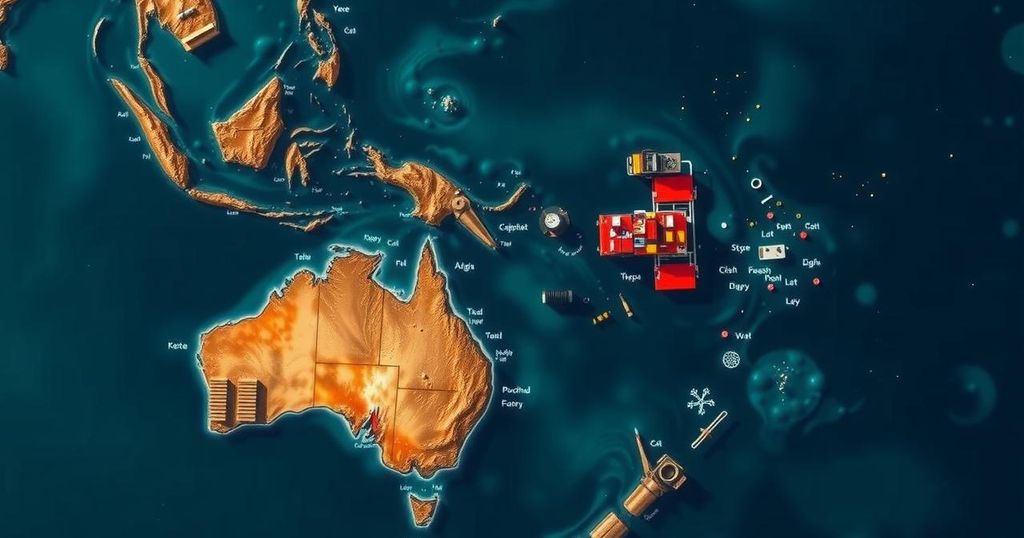Climate change
ASIA, AUSTRALIA, CHINA, CLIMATE CHANGE, CUBA, EUROPE, HAGUE, INTERNATIONAL COOPERATION, INTERNATIONAL COURT OF JUSTICE, MEXICO, NETHERLANDS, NEW YORK, NORTH AMERICA, OCEANIA, OF THE SOUTH PACIFIC, PACIFIC, PARIS AGREEMENT, PORT VILA, SAUDI ARABIA, SUSTAINABLE DEVELOPMENT, THE HAGUE, UN GENERAL ASSEMBLY, UNITED NATIONS, UNITED STATES, UNIVERSITY, UNIVERSITY OF THE SOUTH PACIFIC, VANUATU, WORLD, WORLD COURT
Jamal Walker
0 Comments
Australia’s Climate Dilemma: Fossil Fuel Exports vs. Pacific Partnerships
This article outlines Australia’s conflicting roles as a trusted partner to Pacific nations and a major exporter of fossil fuels. It highlights a recent choice by Australia to support fossil fuel interests in legal proceedings initiated by Vanuatu, challenging major emitters at the International Court of Justice over climate obligations. The outcome could significantly affect Australia’s climate policies and relationships in the region as it balances its economic interests with environmental responsibilities.
Australia is navigating a complex diplomatic landscape as it straddles its roles as both a friendly partner to Pacific nations and a leading exporter of fossil fuels. This week, the government’s decision in favor of fossil fuel exportation has drawn significant criticism, particularly from Pacific nations confronting climate change as an existential risk. As these nations, including Vanuatu, seek to hold major emitters accountable through legal action at the International Court of Justice, Australia is faced with the implications of its ongoing fossil fuel expansion.
At the heart of this legal battle is a case brought forth by Vanuatu following unsatisfactory progress in international climate talks. The International Court of Justice, unique in its capacity to settle disputes between UN member states, is tasked with determining the legal obligations nations have regarding greenhouse gas emissions and potential consequences for causing significant harm to the planet’s climate.
Vanuatu’s initiative, stemming from a legal challenge posed by students at the University of the South Pacific, has evolved into a significant international legal pursuit aimed at achieving climate justice. Australia has allied itself with other fossil fuel exporters to argue against expanding liability for climate change, contending that the Paris Agreement outlines the applicable climate obligations while also attempting to narrow the scope of accountability for greenhouse gas emissions.
The ramifications of this case could be profound for Australia, which has substantially developed its fossil fuel sector over the last two decades. With over 700 oil, gas, and coal projects approved since 2000 and new coal mines recently authorized, Australia’s export emissions have become a critical issue, outstripping domestic emissions. The argument presented by Australia suggests that climate change responsibilities may not be pinned on specific states, with the government asserting that international obligations do not necessarily extend to climate mitigation.
As the International Court of Justice deliberates, the advisory opinion scheduled for release next year may set an important legal precedent. Australia’s current stance may become a point of contention, potentially aggravating relationships with Pacific nations, particularly as they seek clarity regarding the obligations of countries towards climate protection. The forthcoming COP31 bid alongside Pacific nations might present Australia with an opportunity to pivot towards more sustainable practices, possibly enhancing its standing as a partner in climate action.
As the court case progresses, the divergence between Australia’s fossil fuel ambitions and the demands of Pacific nations for climate accountability is likely to intensify, culminating in an essential dialogue about the future of international climate policy and cooperation in the face of the growing climate crisis.
Australia’s dual role as a significant fossil fuel exporter and a partner to Pacific nations has created a diplomatic dilemma, especially in light of increasing concerns over climate change. Many Pacific nations perceive climate change as an immediate existential threat. This week, Australia faced a decisive moment as its federal government sided with climate emitters during a legal case initiated by Vanuatu at the International Court of Justice, raising questions about its commitment to climate action versus fossil fuel exports. The case aims to clarify countries’ obligations to the climate, stemming from decades of activism and advocacy by nations like Vanuatu. Australia’s position may adversely affect its relationships with Pacific island nations as they hold a legal forum to call for accountability on climate change. The outcome of the case holds significant implications for Australia’s future in international climate negotiations.
In conclusion, Australia’s choice to prioritize fossil fuel exportation over climate commitments places it at odds with Pacific nations advocating for climate justice. The ongoing case at the International Court of Justice may establish crucial legal principles that could affect Australia’s export policies and international standing in climate relations. With significant implications for both domestic and international stakeholders, Australia must navigate these urgent issues carefully to maintain its credibility as a trustworthy partner to Pacific nations. The upcoming advisory opinion from the court is expected to provide clarity on state obligations regarding climate protection, significantly influencing the global response to climate change.
Original Source: theconversation.com




Post Comment